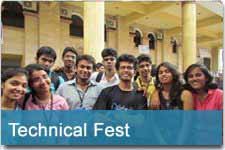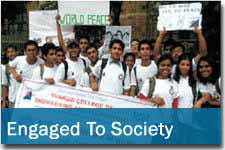
Head of Department & Professor
Department Vision
"Department of Electronics Engineering (ETRX) will strive to achieve academic excellence in electronics and electronics related technical education in University of Mumbai to develop internationally competent professionals with a sense of responsibility and social sensitivity."
Department Mission
To achieve academic excellence by creating the right ambience for nurturing and enhancing personal as well as professional skills that will enable students to compete globally.
Programme Educational Objectives
| PEO1 | To provide students with a strong foundation in the mathematical, scientific and engineering fundamentals necessary to formulate, solve and analyze engineering problems at hand and to prepare them for graduate studies. |
| PEO2 | To prepare students to demonstrate ability to design electrical and electronics systems and conduct experiments, analyze and interpret data. |
| PEO3 | To prepare students to demonstrate ability to design electrical and electronics systems and conduct experiments, analyze and interpret data. |
| PEO4 | To prepare students to demonstrate for successful career in industry to meet the needs of Indian and multi-national companies. |
| PEO5 | To develop the ability among students to synthesize data and technical concepts from applications to product design. |
| PEO6 | To provide opportunity to students to work as a team on multidisciplinary projects and to promote awareness among students for life-long learning and introduce them to professional ethics and codes of professional practice. |
Programme Outcomes
| PO1 | Ability to demonstrate knowledge of
electrical and electronics engineering. |
| PO2 | Ability to demonstrate ability to
identify, formulate and solve electronics
engineering problems. |
| PO3 | Ability to design electrical and electronic
circuits and conduct experiments with
electrical systems, analyze and interpret
data. |
| PO4 | Ability to design digital and analog
systems and component. |
| PO5 | Ability to visualize and work on
laboratory and multidisciplinary tasks. |
| PO6 | Ability to demonstrate skills to use
modern engineering tools, software and
equipment to analyze problems. |
| PO7 | Ability to demonstrate knowledge
of professional and ethical
responsibilities. |
| PO8 | Ability to communicate effectively in
both verbal and written form. |
| PO9 | Understanding of impact of
engineering solutions on the
society and also will be aware of
contemporary issues. |
| P10 | To develop confidence for self
education and ability for life-long
learning. |
| P11 | Ability to recognize and adapt to
emerging applications in engineering
and technology. |
| P12 | To participate and succeed in
competitive examinations like GATE,
GRE. |
Major Subjects
Basic Engineering: Electronic Devices and Circuits I and Electronic Devices and Circuits II (EDC I and EDC II), Electrical Network Analysis and Synthesis (ENAS), Linear Control Systems (LCS), Advanced Engineering Mathematics (Applied Mathematics III and Applied Mathematics IV) , Microprocessors and Applications , Fundamentals of Communication Engineering (FCE), Digital Circuits Design (DCD), Electronics Instruments and Measurement, Object Oriented Programming Methodology, Business Communication and Ethics etc.
Core Engineering : Signals & Systems (SS), Electromagnetic Engineering (EME) , Design with Linear Integrated Circuits (DLIC), Digital Communication (DC), Mini Project I and Mini Project II, , Microcontrollers and Applications (MCA), Basic VLSI design etc.
Advanced Engineering:Computer Organization (CO), Advanced Instrumentation Systems (AIS), Digital Signal Processing and Processors (DSPP), Advanced Networking Technologies, CMOS VLSI Design, Power Electronics, Artificial Intelligence, Embedded System Design, IC Technology etc.
Application based :Robotics, Digital Image Processing, Optical fiber Communication, Biomedical Electronics, Mobile Communication, Artificial Intelligence etc.
Highlights
| Year of starting of programme | : 2008-2009 |
| Year of establishment | : 2009-2010 |
| Programme offered | : 4 years B.E. (ETRX) |
| Faculty strength | : 14 |
| Departmental Library | : 218 books 76 Black books |
| No. of batches graduated | : 05 |
| Success rate | : 57.33% |
| Professional chapter | : IETE |
| Student membership | : IEEE, NSS, IETE |
| Number of Labs | : 08 |
| Number of Class rooms | : 03+1 Tutorial Room |
| Common Facilities | : Seminar Hall-01,Seminar Hall-02,Seminar Hall-03 |
| Publication | Department's E-Magazine |
Result Highlights
Topper List
| Name of the student | Percentage | Year |
|---|---|---|
| Mr. Umrigar Arhis Rumi Navaz | CGPI- 8.79 | May-2016 |
| Mr. Kanojiya Mangesh Radheshyam Rishi | CGPI- 8.56 | May-2016 |
| Mr. Aditya Anant Palekar (7th rank in University) | 79.22% | May-2015 |
| Miss. Vaid Pooja Rampal Geeta (26th rank in University) | 75.48% | May-2014 |
| Mr. Sharma Chirag Rajendra Sushma (85th rank in University) | 73.48% | May-2014 |
| Miss. Bhalani Mansi Shailesh Meena (116th rank in University) | 72.75% | May-2014 |
| Mr Tanmay Padgoankar | 78.32% | May-2013 |
| Mr. Amit Shriram Dubey | 78.32% | May-2013 |
| Mr.Pradeep V. Davda (4th Rank in University) |
80.32 | May-2012 |
Best Practices (Student-Centric)
- Academic delivery as per the curriculum of UOM
- Continuous monthly monitoring of attendance
- Parents Meeting
- Teacher-Guardian scheme
- Orientation programmes/ seminar/ workshops, industrial visits etc.
- Training / ISO awareness programme
- Mini-projects at second year to develop practical skills.
- BE projects based on research papers & industry based
- Quality Improvement Programme and R&D activities
- Industry-institute interaction
- Technical Paper Presentation Activity
- Encouraging Students to participate in Inter-collegiate Technical Festivals
Faculty Highlights
Publication
| Publications | Number of Faculty members | Number of Publications |
|---|---|---|
| ICWET + Multicon-W Publication | 12 | 62 |
| International/National Journals | 12 | 37 |
| National Conferences | 12 | 23 |
| International Conferences | 12 | 69 |
| Book Publication | 03 | 03 |
| Modules Publication | 15 | 20 |


